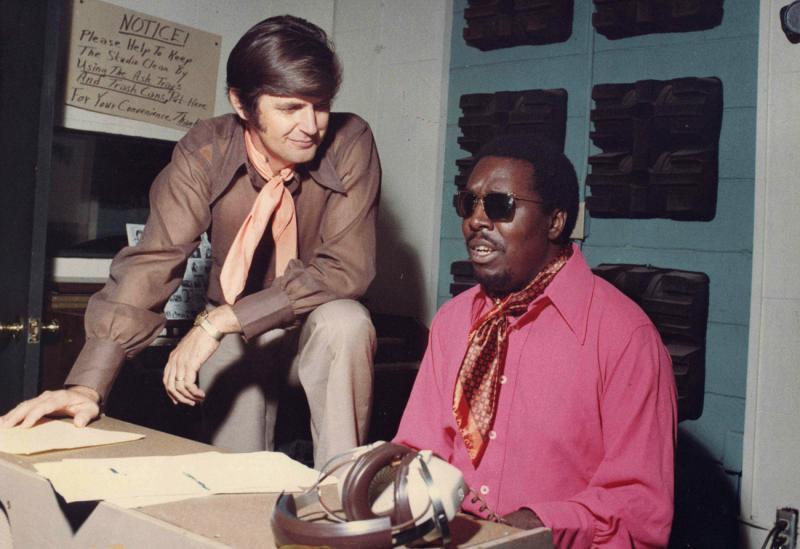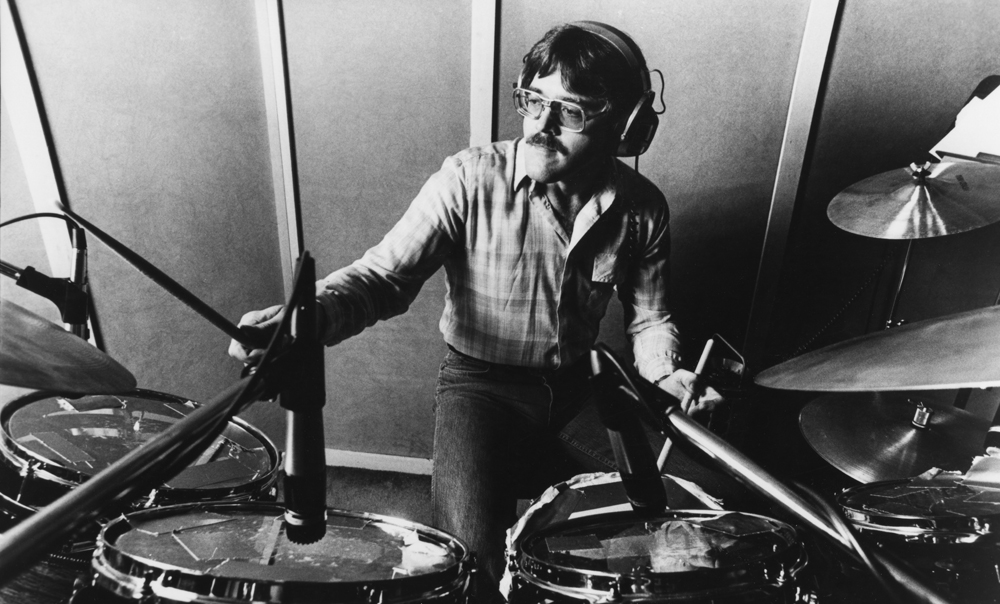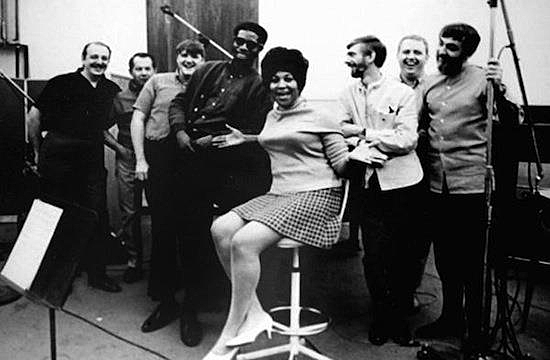Storyville - Muscle Shoals: the Greatest Recording Studio in the World, BBC Four | reviews, news & interviews
Storyville - Muscle Shoals: the Greatest Recording Studio in the World, BBC Four
Storyville - Muscle Shoals: the Greatest Recording Studio in the World, BBC Four
History of the big sound from the little town in Alabama

Back in the days before you could bash together an album on a phone, recording used to involve a group of musicians playing together in the same room. Finding the perfect studio ambience and acoustic was 90 per cent of the battle, and many a veteran musician will tell you that the studios in Muscle Shoals, Alabama were the greatest of them all.
Many of these old troupers had been rounded up by film-maker Greg Camalier for this fine and evocative documentary, which avoided the Brian Pern-style cliches of the bog standard rock-doc by being packed with great stories, brilliant music and loads of human interest. Equally, it was a resonant portrait of a time and a place. Muscle Shoals, with a population of 8,000, barely qualifies as a town, but Camalier let his camera linger thoughtfully over local landscapes of swamps, forests, cotton fields and the Tennesee River, which was traditionally known as the "Singing River" by the Yuchi indians (studio drummer Roger Hawkins, pictured below).
 It was Rick Hall's FAME Studios which first put the town on the map, and Hall himself was as much a star of the show as such glittering interviewees as Wilson Pickett, Percy Sledge, Keith Richards, Mick Jagger and Aretha Franklin. Kind of a dark star in Hall's case, though. A ruthlessly driven man from an impoverished background, whose life has seen a daunting share of setbacks and deaths, Hall set out to break big in the music business, and knew he was on the right track when the first song recorded at his own studio, Arthur Alexander's "You Better Move On", became an international chart-topper.
It was Rick Hall's FAME Studios which first put the town on the map, and Hall himself was as much a star of the show as such glittering interviewees as Wilson Pickett, Percy Sledge, Keith Richards, Mick Jagger and Aretha Franklin. Kind of a dark star in Hall's case, though. A ruthlessly driven man from an impoverished background, whose life has seen a daunting share of setbacks and deaths, Hall set out to break big in the music business, and knew he was on the right track when the first song recorded at his own studio, Arthur Alexander's "You Better Move On", became an international chart-topper.
Soon Hall was cranking out soul classics like "Land of a Thousand Dances" and "Mustang Sally" with Wilson Pickett, and he thought his ship had come in when Atlantic Records' Jerry Wexler brought Aretha Franklin (pictured below) down to Alabama to record "I Never Loved a Man". Nobody hearing these records could believe that Hall's superb squad of studio musicians - including Spooner Oldham, Jimmy Johnson, Roger Hawkins and Barry Beckett - were all white (when Paul Simon asked to record with the black musicians at Muscle Shoals, he was warned that "these guys are mighty pale"). It was especially amazing that this emancipated music-making was going on when Alabama's governor, George Wallace, was loudly espousing a policy of "Segregation Forever".
 However, the uncompromising Hall fell out badly with Wexler, who bankrolled the founding of the new Muscle Shoals Sound Studio by a quartet of the FAME musicians (the so-called "Swampers") so he wouldn't have to work with Hall ever again. The new setup gained a big boost when the Rolling Stones dropped by to record "Brown Sugar" and "Wild Horses", and subsequently everyone from Elton John and Dylan to Boz Scaggs and Willie Nelson clamoured to record there.
However, the uncompromising Hall fell out badly with Wexler, who bankrolled the founding of the new Muscle Shoals Sound Studio by a quartet of the FAME musicians (the so-called "Swampers") so he wouldn't have to work with Hall ever again. The new setup gained a big boost when the Rolling Stones dropped by to record "Brown Sugar" and "Wild Horses", and subsequently everyone from Elton John and Dylan to Boz Scaggs and Willie Nelson clamoured to record there.
Hall, meaner than a rattlesnake with a knot tied in its tail, refused to quit. Even though he failed to spot the potential of the up-and-coming Allman Brothers Band (too hippyish for his disciplinarian tastes), he inked a lucrative deal with Capitol Records and enjoyed a lavish new streak of success. Judging by recent footage of him producing a recording session, he hasn't wasted any of his precious earnings on a diploma from charm school.
rating
Explore topics
Share this article
Add comment
The future of Arts Journalism
You can stop theartsdesk.com closing!
We urgently need financing to survive. Our fundraising drive has thus far raised £49,000 but we need to reach £100,000 or we will be forced to close. Please contribute here: https://gofund.me/c3f6033d
And if you can forward this information to anyone who might assist, we’d be grateful.

Subscribe to theartsdesk.com
Thank you for continuing to read our work on theartsdesk.com. For unlimited access to every article in its entirety, including our archive of more than 15,000 pieces, we're asking for £5 per month or £40 per year. We feel it's a very good deal, and hope you do too.
To take a subscription now simply click here.
And if you're looking for that extra gift for a friend or family member, why not treat them to a theartsdesk.com gift subscription?
more TV
 The Perfect Neighbor, Netflix review - Florida found-footage documentary is a harrowing watch
Sundance winner chronicles a death that should have been prevented
The Perfect Neighbor, Netflix review - Florida found-footage documentary is a harrowing watch
Sundance winner chronicles a death that should have been prevented
 Murder Before Evensong, Acorn TV review - death comes to the picturesque village of Champton
The Rev Richard Coles's sleuthing cleric hits the screen
Murder Before Evensong, Acorn TV review - death comes to the picturesque village of Champton
The Rev Richard Coles's sleuthing cleric hits the screen
 Black Rabbit, Netflix review - grime and punishment in New York City
Jude Law and Jason Bateman tread the thin line between love and hate
Black Rabbit, Netflix review - grime and punishment in New York City
Jude Law and Jason Bateman tread the thin line between love and hate
 The Hack, ITV review - plodding anatomy of twin UK scandals
Jack Thorne's skill can't disguise the bagginess of his double-headed material
The Hack, ITV review - plodding anatomy of twin UK scandals
Jack Thorne's skill can't disguise the bagginess of his double-headed material
 Slow Horses, Series 5, Apple TV+ review - terror, trauma and impeccable comic timing
Jackson Lamb's band of MI5 misfits continues to fascinate and amuse
Slow Horses, Series 5, Apple TV+ review - terror, trauma and impeccable comic timing
Jackson Lamb's band of MI5 misfits continues to fascinate and amuse
 Coldwater, ITV1 review - horror and black comedy in the Highlands
Superb cast lights up David Ireland's cunning thriller
Coldwater, ITV1 review - horror and black comedy in the Highlands
Superb cast lights up David Ireland's cunning thriller
 Blu-ray: The Sweeney - Series One
Influential and entertaining 1970s police drama, handsomely restored
Blu-ray: The Sweeney - Series One
Influential and entertaining 1970s police drama, handsomely restored
 I Fought the Law, ITVX review - how an 800-year-old law was challenged and changed
Sheridan Smith's raw performance dominates ITV's new docudrama about injustice
I Fought the Law, ITVX review - how an 800-year-old law was challenged and changed
Sheridan Smith's raw performance dominates ITV's new docudrama about injustice
 The Paper, Sky Max review - a spinoff of the US Office worth waiting 20 years for
Perfectly judged recycling of the original's key elements, with a star turn at its heart
The Paper, Sky Max review - a spinoff of the US Office worth waiting 20 years for
Perfectly judged recycling of the original's key elements, with a star turn at its heart
 The Guest, BBC One review - be careful what you wish for
A terrific Eve Myles stars in addictive Welsh mystery
The Guest, BBC One review - be careful what you wish for
A terrific Eve Myles stars in addictive Welsh mystery
 theartsdesk Q&A: Suranne Jones on 'Hostage', power pants and politics
The star and producer talks about taking on the role of Prime Minister, wearing high heels and living in the public eye
theartsdesk Q&A: Suranne Jones on 'Hostage', power pants and politics
The star and producer talks about taking on the role of Prime Minister, wearing high heels and living in the public eye
 King & Conqueror, BBC One review - not many kicks in 1066
Turgid medieval drama leaves viewers in the dark
King & Conqueror, BBC One review - not many kicks in 1066
Turgid medieval drama leaves viewers in the dark

Comments
This was a treasure trove of